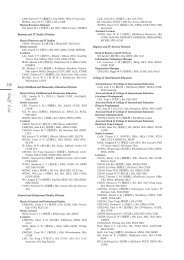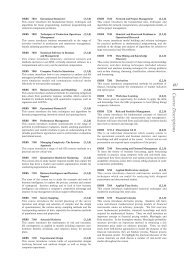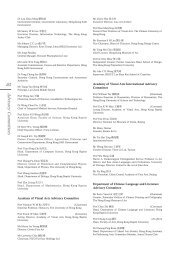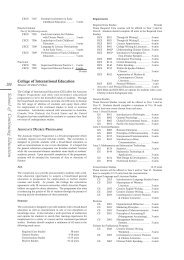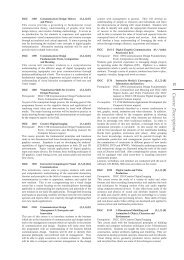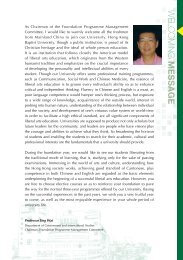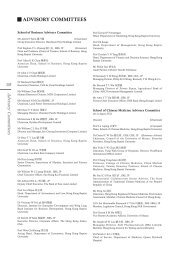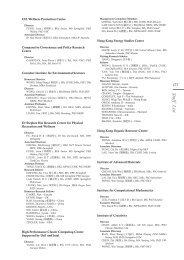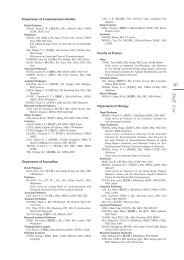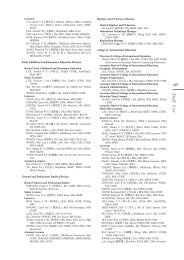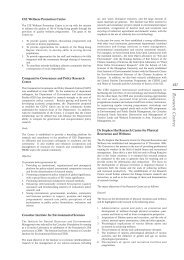332<strong>Course</strong> <strong>Descriptions</strong>ENGL 4056 Theoretical Linguist Meets World (3,3,0)Prerequisite: ENGL 2005 Introduction to the Study ofLanguageThis course will enable students to relate and apply their disciplinein theoretical linguistics to a wider spectrum of disciplinesand to the practicalities of daily life. It will broaden students’perspectives on the relevance of other disciplines to linguistics andcultivate a sense of a larger academic context. The course willalso provide greater interdisciplinary scope.ENGL 4057 Unravelling Syntax (3,3,0)Prerequisite: ENGL 2005 Introduction to the Study ofLanguageThis course will introduce current theories of grammar, and themajor contemporary research on formal syntax in particular. Itwill familiarize students will the explanatory aims of syntactictheorizing.ENGL 4898-9 Honours Project (3,0,3)This course will (1) require students to demonstrate theirknowledge of the field within their selected topic, their researchskills, as well as their ability to express their ideas in a persuasiveand well-structured exegesis; and (2) engage the student inindependent research and the production of an extensive researchor creative project.EPHM 7010 Sustainable Management Systems (3,3,0)The course focuses on different management approaches tosustainability from local to global perspectives. Focus will beon how environmental management system and environmentalimpact assessment can help achieve the goal of environmentalsustainability.EPHM 7020 Management of Public Health Risks (3,3,0)This course focuses on understanding the range, limitations andimpact of public health policies. It also trains students to developskills to identify the principal factors imposing impacts on humanand other environmental species and to assess the significance ofemerging issues in an objective manner.EPHM 7040 Land and Water Resources (3,3,0)ManagementThis course provides background information on water, soiland vegetation, as well as the effects of industrial and economicdevelopment on land quality and water safety. Different strategieson land and water resources management for sustainabledevelopment are also discussed.EPHM 7050 Integrated Waste Management (3,3,0)The amount of waste/solid waste produced every day istremendous and ways of properly handling and disposing thempermanently have always been in demand. The course exploresand compares different options and strategies in reducing,handling, and treatment of solid waste with due emphasis on theinportance of adopting an integrated approach in managing waste.EPHM 7070 Research and Environmental (3,3,0)Monitoring MethodologyThe course focuses on different approaches and methods toconduct environmental monitoring and evironmental research.Basic principles of these research and monitoring methods willbe dealt with adequately so that students will be able to formulatetheir own research or monitoring strategies to deal with newenvironmental problems when they have completed the course.EPHM 7110 Principles of Environmental (3,3,0)ManagementThis course studies ecosystems and its relationship withatmospheric, hydrological and geomorphological systems.The impacts of human activities on the delicate balanceof ecosystems, as well as the ethical bases of conservationbiology, will also be examined. The course introduces the basicprinciples in environmental management, illustrates scientificprinciples by building on worldwide and familiar examples, andencourages students to become personally involved with solvingenvironmental problems.EPHM 7311-2 MSc Dissertation (3,*,*)This project is designed for students to apply and integrate theorieslearnt to real-life problems so that better understanding of theenvironmental issues will be resulted. Through the execution ofthe project, students will also learn the proper ways of conductingresearch and preparing documents for review.EPHM 7320 Occupational Health and Safety (3,3,0)ManagementThis course provides an understanding on occupational healthand safety with due emphasis on a variety of commonly adoptedmanagement approaches and methods. This includes theidentification procedures for the principal causes of ill healthand poor safety at workplace and strategies for eliminatingor ameliorating them. The legal and operational aspects ofoccupational health and safety are also adequately dealt with.EPHM 7330 Food Quality, Law and Safety (3,3,0)ManagementThe course is designed to introduce students to the growingconsumer demand in food safety and growing awareness ofthe food industry in the importance of maintaining high foodquality. This course covers the principles and internationalstandards of food quality and safety management, and providesan understanding of the legislative control related to food quality,safety and human health protection in <strong>Hong</strong> <strong>Kong</strong>.EPHM 7340 Carbon and Energy Management (3,*,*)This course provides students with an understanding on carbonand energy management with due emphasis on a variety ofcommonly adopted management approaches and methods. Thisincludes carbon accounting or the identificaiton and quantificationof greenhouse gas emission sources and sinks, carbon footprintingof products and services, carbon neutrality, energy auditand management, measurement and verification of energyperformance projects, and the related carbon and energy standards.EURO 1008 Europe: Unity and Diversity I (3,2,1) (E)This is the first part of a two-semester course which providesstudents with the necessary initial background knowledge ofEurope as a whole. It seeks to stimulate the students’ interest bylooking at European history through the particular prism of theshifting balance between unity and diversity, concentrating onparticular turning points. It introduces students to the variousdefinitions of “Europe” and Europe’s historical roots in theantique Mediterranean civilizations. The synthesis of the Greco-Roman and Christian with the Germanic heritages in the MiddleAges and the subsequent Renaissance laid the foundations forthe culturally multi-faceted modern European societies, whichnonetheless share a common tradition in thought and action.EURO 1009 Europe: Unity and Diversity II (3,2,1) (E)Prerequisite: EURO 1008 Europe: Unity and Diversity I orequivalentThis course is a continuation of EURO 1008. It will focus onearly modern Europe from the 16th to 18th centuries. It discussesthe gradual emergence of a “European model of development”characterized by representative forms of government, essentialfreedom of economic activity and protection of private propertyrights, as well as a set of cultural values stimulating growth andsocial development.The course will discuss the formation of European compositeand (eventually) nation states and their interminable domesticand external conflicts, which crucially led to the projectionof European power overseas. It will analyse cultural conflicts
attendant to the break-up of medieval Christian unity, and therise of national and regional diversities still extant today. In theprocess, two competing models of societies evolved: an essentiallymarket-driven, potentially liberal, decentralized structure, and aconservative-autocratic model of governance, typified here by theDutch United Provinces and the kingdom of France, respectively.Out of their conflicts arose the all-European cultural movementcalled the Enlightenment, which arguably remains the singlemost important source for the values and principles on whichthe modern European Union and a common European identity arefounded.EURO 1111-2 Europe: Unity and Diversity (3,2,1)The course introduces students to the various definitions of“Europe” and the continent’s historical roots in the antiqueMediterranean civilizations. The synthesis of the Greek/Roman,Christian and Germanic heritages in the Middle Ages and theRenaissance laid the foundations for the culturally multi-facetedmodern European societies, which nonetheless share a commonphilosophical core. Through successive stages of political andeconomic development marked by significant internal and externalconflicts, modern liberal thought was formed, and its equivalentin the economic sphere: the wealth-generating capitalist societies.The seeming contradiction between the principles of individualfreedom and social equality led the continent to near selfdestructionin ideological warfare, out of which finally emergedthe post-war model of trans-nationally cooperating bureaucraticwelfare states: the European Union.EURO 2005 Contemporary European Societies (3,2,1) (E)I: The French-Speaking CountriesPrerequisite: EURO 1008-9 Europe: Unity and DiversityThis course will enable students to acquire a broad knowledge andunderstanding of the main features of French-speaking countriesof Europe (France, Belgium, Luxembourg and Switzerland). Itwill prepare them for their stay in Europe during Year III bytraining them to critically evaluate the social, political, culturaland economic conditions in these countries. It will also help themto elaborate the conceptual framework to be used when gatheringinformation in Europe for the final year Honours Project.EURO 2006 Contemporary European Societies (3,2,1) (E)I: The German-Speaking CountriesPrerequisite: EURO 1008-9 Europe: Unity and DiversityThis is the first part of a course, which spans the internship yearin Europe. It acquaints students with salient characteristics of thesocial, cultural, political and economic life in Germany, Austriaand Switzerland, as these have a direct impact on individual lifestyles and life experiences. The course also prepares students togather and systematize HP-relevant information during their thirdyear in Europe.EURO 2007 The Political Economy of the (3,2,1) (E)European UnionPrerequisite: For GIS/ES major: POLS 1005 Foundations ofPolitical Science or EURO 1008-9 Europe: Unityand DiversityThis is a course which examines the causes and historicalevolution of European integration and looks analytically at theinstitutions and the policies of the European Union. It providesa focused examination of the political economy of Europeanintegration, highlighting the dynamic relationship betweeneconomic and political integration and the respective roles of themember states, the EU institutions, and the market. Moreover,it highlights the complexities and difficulties in constructing aEuropean constitutional order and offers a critical examination ofthe process of institutional building. It provides a critical reviewof the main theoretical contributions to the debate on Europeanintegration, and explores the prospects for the enlarged EU in thepost-communist era.EURO 2110 Contemporary European Societies (3,2,1) (E)I: The French-Speaking CountriesPrerequisite: EURO 1111-2 Europe: Unity and DiversityBased on historical knowledge previously acquired by thestudents, particularly in EURO 1111-2 Europe: Unity andDiversity, the course will elaborate on the specific evolution of theFrench-speaking societies of France, Belgium, Switzerland andLuxembourg. The students are required to grasp the historical,economic, social, political and cultural components that shapedthe present-day European French-speaking countries. The courseprepares students for their stay in Europe during Year III bytraining them to critically evaluate the social, political, culturaland economic conditions of the above-mentioned countries andrelate them to intercultural matters using a conceptual frameworkof social/political study. This course is open to European Studiesmajors only.EURO 2120 Contemporary European Societies (3,3,0) (E)I: The German-Speaking CountriesPrerequisite: EURO 1111-2 Europe: Unity and DiversityThis is the first part of a course, which spans the internship yearin Europe. Essential information about current social, politicaland economic affairs in the German, Austrian and Swiss societieswill be presented. This course follows an inductive approach.It aims to explore the extent to which historical and politicalconditions have shaped individual lifestyles and the Weltbild ofcontemporary citizens. This course is open to European Studiesmajors only.EURO 2140 The Political Economy of the (3,2,1) (E)European UnionPrerequisite: POLS 1510 Foundations of Political Science orEURO 1111-2 Europe: Unity and DiversityThe progressive integration of the countries of Europe since theend of the Second World War has been one of the most originaland significant developments in modern history. At the start theprocess was limited to six core countries in Western Europe andwas concerned most exclusively with strictly economic matters.With the end of the Cold War the European Union has enlarged,and its area of competence has widened to include defence andsecurity, justice and home affairs. The course examines the causesand historical evolution of European unification and then looksanalytically at the institutions and the policies of the Union,assessing their effectiveness and investigating their implicationsfor the rest of the world. It also explores the issues arisingfrom eastwards enlargement in the post-Communist period.Theoretically, it provides focused examination of the politicaleconomy of European integration, highlighting to the dynamicrelationship between economic and political integration andthe respective roles of states, markets and EU institutions. Thiscourse is open to Year II and Year III majors in GIS and Year IImajors in European Studies only.EURO 2610 Comparative Politics of (3,2,1) (E)Post-Communist Central EuropePrerequisite: POLS 1510 Foundations of Political Science orEURO 1111-2 Europe: Unity and DiversityThis course examines the Central European states of Poland,Hungary, the Czech Republic and Slovakia in historical andcomparative context. It begins with a discussion of the nature andweaknesses of the Communist regimes of Eastern Europe andthe causes and processes of the 1989 upheavals in the region. Itthen considers the paradoxes and obstacles in the course of post-Communist transition to democracy and the market economy.The key issues of democratic consolidation and pro-markettransformation will be addressed.EURO 3008-9 European <strong>Academic</strong>/Internship (21,*,*)Semester I & IIPrerequisite: FREN 2009 European Language in Context II(French) or GERM 2009 European Language inContext II (German) and sufficient GPA in Year IIThe European <strong>Academic</strong>/Internship Semester provides fulllinguistic and cultural immersion into the societies of French- or333<strong>Course</strong> <strong>Descriptions</strong>
- Page 3 and 4: economic growth, trade, pollution,
- Page 5 and 6: specific empirical economic problem
- Page 7 and 8: of private enterprises in the indus
- Page 9 and 10: period. The first part of the cours
- Page 11 and 12: The reactions and effectiveness of
- Page 14: 314Course DescriptionsEDUC 3080 Tea
- Page 17 and 18: development of children and adolesc
- Page 19 and 20: and communication skills in differe
- Page 21 and 22: y ubiquitous technology. Learners w
- Page 23 and 24: ENG 2650 Topics in English Grammar
- Page 25 and 26: clause structures of the English la
- Page 27 and 28: adopted for reading and interpretin
- Page 29 and 30: drama; and (2) introduce Western dr
- Page 31: ENGL 4005 Advanced Topic in Compara
- Page 35 and 36: EURO 3205 Comparative Politics of (
- Page 37 and 38: states, enlargement provides signif
- Page 39 and 40: to create and develop ideas via rel
- Page 41 and 42: strategies of awarded campaigns to
- Page 43 and 44: characteristics of films, film-make
- Page 46: 346Course DescriptionsFINE 1005 Fin
- Page 49 and 50: GCHC 1005 China and the Global Econ
- Page 51 and 52: the period with a special focus on
- Page 53 and 54: est decision-making procedures. Mor
- Page 55 and 56: GCPE 1065 Table Tennis (1,2,0) (C)T
- Page 57 and 58: and/or philosophical traditions the
- Page 59 and 60: on the use of English in various se
- Page 61 and 62: GDAR 1835 Music, Mind, and Human (3
- Page 63 and 64: lead to successful development of n
- Page 65 and 66: management and proactive stakeholde
- Page 67 and 68: GDCV 1065 Buildings of Hong Kong: (
- Page 69 and 70: of various religions that broaden t
- Page 71 and 72: their implications for contemporary
- Page 73 and 74: gone through since 1945 included th
- Page 75 and 76: GEOG 1005 Geography and the Contemp
- Page 77 and 78: students to the concepts and techni
- Page 79 and 80: GEOG 3730 Energy Policy and Analysi
- Page 81 and 82: processes interact with China’s s
- Page 83 and 84:
GERM 1006 German II (3,3,0) (G)Prer



